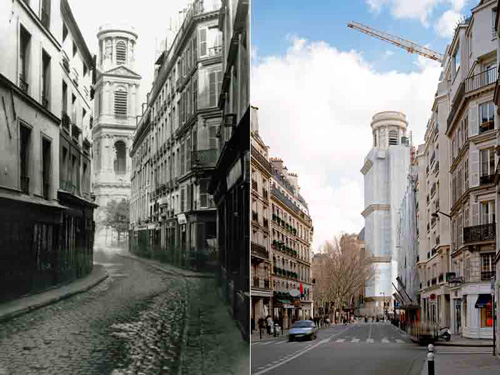T.J. Clark, The Painting of Modern Life
A Feeling of a Lost Paris
The critics said that they had lost Paris and were living in someone else's city. This was a figure of speech, and people were not necessarily meant to take it seriously. The playwright Victorien Sardou put on a comedy, Maison neuve [New House] in 1866, and seemed to make light of the fears of an elderly haberdasher in the face of progress. The character's nephew and niece are intent on moving to the Boulevard Malesherbes and ask him, laughing, what it is he has against the new Paris. what he thinks will be lost by changing places. He replies in a grand speech:
speech, and people were not necessarily meant to take it seriously. The playwright Victorien Sardou put on a comedy, Maison neuve [New House] in 1866, and seemed to make light of the fears of an elderly haberdasher in the face of progress. The character's nephew and niece are intent on moving to the Boulevard Malesherbes and ask him, laughing, what it is he has against the new Paris. what he thinks will be lost by changing places. He replies in a grand speech:
Dear child! It is the old Paris that is lost, the was narrow, unhealthy, insufficient, but picturesque, varied, charming, full of memories. We had our favourite walks a step or two away, and our favourite sights, all happily grouped together! We had our little outings with our own folk: how nice it was!... Going for a stroll was not something that tired you out. it was a delight. It gave birth to that eminently Parisian compromise between laziness and activity known as flanerie! [There is no English equivalent to this term, but it means something like a stroller through the city.”] Nowadays, for the least excursion, there are miles to go! A muddy thoroughfare which women cross without grace, since it no longer has the elasticity of the old paving stones to support them! An eternal sidewalk going on and on forever! A tree, a bench, a kiosk! ..
And on top of all that, the sun! the dust, the mess! the dirt! A crowd of people of all shapes and sizes, cosmopolitans jabbering away in every language, decked out in every conceivable colour. Nothing left of the things which once constituted our own little world, a world apart; a world of expertise, judgement and refinement, an elite of wit and good taste. -- What is it we are losing, by God? Everything! This is not Athens any longer, it is Babylon! It is not the capital of France, but of Europe! A wonder, we shall never see the like – a world! – agreed . . . Nevertheless, it isn't Paris and there are no Parisians any longer.
CLAIRE, in reply: Come now, uncle. don't you understand how grand it is, how comfortable, how hygienic?
GENEVOIX, again: But haven't I told you that I admire it! It was inevitable; they had to do it, they did it! They did well! and altogether, things have turned out for the best! Long live the city! I applaud it heartily-and beg leave to think it fortunate that God himself was ignorant of this marvellous municipal system, and did not choose to arrange the trees in the forest in rows ... with all the stars above in two straight lines.
We are presumably meant to laugh, and sympathize, and have more than a sneaking feeling that Genevoix may be right. And so it proves: the new house on the Boulevard Malesherbes turns out to be a financial (and moral) disaster, and the comedy ends with the family chastened and reunited in the draper's shop on the Rue Saint-Denis. Sardou knew his vaudeville audience well: he contrived the denouement he thought they wanted.